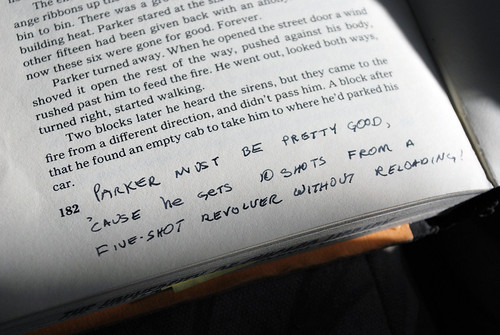Recently there's been another, wholly unexpected effect, one that I won't claim any actual credit for but am glad to have played a small part in generating: inspired, he says, by The Getaway Car, for which he wrote a foreword, Lawrence Block has just assembled and published a collection of his own nonfiction writing about his career and the work of other writers. Titled The Crime of Our Lives, it's just been published, and it's full of great stuff. Block has long been a garrulous commenter on his own books, supplying forewords and head notes and afterwords to collections and new editions, pieces that are always funny, but at the same time serious about the work of writing and the way that a moment in a writer's life and career becomes crystallized in a particular book or story. For this collection, however, we get, not so much Block the host, but Block the guest: it mostly consists of his introductions for and articles about his peers, mentors, friends, and colleagues in the writing world, from the expected (Chandler, Hammett, Spillane, and, of course, Westlake) to the more surprising (Poe, Joseph Conrad). Each one is pure Block: idiosyncratic, anecdotal, personal, and wholly engaged with the craft and job of writing.
If all goes well, I'll be interviewing Larry about the collection soon for the new crime site The Life Sentence, so I won't go into much more detail here, but I can't close without quoting a couple of the pieces. First, for their sheer goofy humor, here are the first lines of an introduction to a collection of Ed Gorman short stories:
Ed Gorman is a terrific writer, and you're going to have a wonderful time reading these stories.No surprise: he does.
Now what?
That's seventeen words. Pete Crowther, who asked me to write this introduction, has given me to understand that introductions to the volumes he publishes run in the neighborhood of a thousand words. That's not a bad neighborhood, you wouldn't be afraid to wander there after dark, but the seventeen words I've written leave me with nine hundred and eighty-seven words to write, and what am I going to write to take up the slack? I mean, I've already said everything I really have to say on the subject. Here are some stories. Read them, and leave me alone. What else is there to say?
Well, I'll think of something. I am, after all, a professional writer.
Here he is offering a take on a question that Westlake, too, pondered: Why did Dashiell Hammett burn out so quickly?
I wonder if an answer might not lurk in the one scene in The Maltese Falcon not to be found in the Huston screenplay. In it, Spade recounts at length the seemingly pointless story of a man named Flitcraft, who left his home and family and disappeared after nearly being killed by a beam falling from a construction site. By the time Spade succeeded in finding him, the man had re-created essentially the same middle-class life in another cit with another family. Spade explains:And, finally, here the opening of his obituary for his longtime friend Donald Westlake, written the day after Westlake's death, at the request of the Mystery Writers of America:
But that's the part I always liked. he adjusted himself to beams falling, and then no more of them fell, and he adjusted himself to them not falling.A beam fell and Dashiell Hammett taught himself to be a writer. Then no more beams fell, and he adjusted himself to that.
When the phone call came and brought the bad news, one of the first things that came to mind was John O'Hara's line: "George Gershwin died yesterday, but I don't have to believe that if I don't want to."Go get the book. You'll enjoy it.
{As for The Life Sentence: it's well worth checking out. I'm one of many members of its advisory board, though I deserve credit thus far for nothing but encouragement, so the recommendation is genuine: this week kicked off with an interview of the always interesting Laura Lippmann by site founder Lisa Levy, and much, much more is promised in the coming weeks.}



